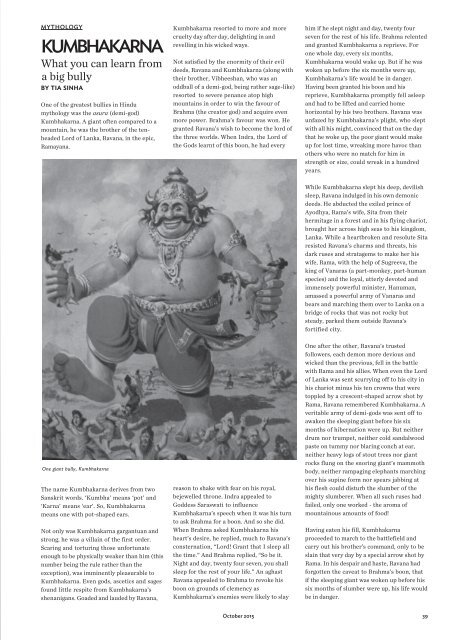Namaskar Oct 2015
You also want an ePaper? Increase the reach of your titles
YUMPU automatically turns print PDFs into web optimized ePapers that Google loves.
MYTHOLOGY<br />
KUMBHAKARNA<br />
What you can learn from<br />
a big bully<br />
BY TIA SINHA<br />
One of the greatest bullies in Hindu<br />
mythology was the asura (demi-god)<br />
Kumbhakarna. A giant often compared to a<br />
mountain, he was the brother of the tenheaded<br />
Lord of Lanka, Ravana, in the epic,<br />
Ramayana.<br />
Kumbhakarna resorted to more and more<br />
cruelty day after day, delighting in and<br />
revelling in his wicked ways.<br />
Not satisfied by the enormity of their evil<br />
deeds, Ravana and Kumbhakarna (along with<br />
their brother, Vibheeshan, who was an<br />
oddball of a demi-god, being rather sage-like)<br />
resorted to severe penance atop high<br />
mountains in order to win the favour of<br />
Brahma (the creator god) and acquire even<br />
more power. Brahma’s favour was won. He<br />
granted Ravana’s wish to become the lord of<br />
the three worlds. When Indra, the Lord of<br />
the Gods learnt of this boon, he had every<br />
him if he slept night and day, twenty four<br />
seven for the rest of his life. Brahma relented<br />
and granted Kumbhakarna a reprieve. For<br />
one whole day, every six months,<br />
Kumbhakarna would wake up. But if he was<br />
woken up before the six months were up,<br />
Kumbhakarna’s life would be in danger.<br />
Having been granted his boon and his<br />
reprieve, Kumbhakarna promptly fell asleep<br />
and had to be lifted and carried home<br />
horizontal by his two brothers. Ravana was<br />
unfazed by Kumbhakarna’s plight, who slept<br />
with all his might, convinced that on the day<br />
that he woke up, the poor giant would make<br />
up for lost time, wreaking more havoc than<br />
others who were no match for him in<br />
strength or size, could wreak in a hundred<br />
years.<br />
While Kumbhakarna slept his deep, devilish<br />
sleep, Ravana indulged in his own demonic<br />
deeds. He abducted the exiled prince of<br />
Ayodhya, Rama’s wife, Sita from their<br />
hermitage in a forest and in his flying chariot,<br />
brought her across high seas to his kingdom,<br />
Lanka. While a heartbroken and resolute Sita<br />
resisted Ravana’s charms and threats, his<br />
dark ruses and stratagems to make her his<br />
wife, Rama, with the help of Sugreeva, the<br />
king of Vanaras (a part-monkey, part-human<br />
species) and the loyal, utterly devoted and<br />
immensely powerful minister, Hanuman,<br />
amassed a powerful army of Vanaras and<br />
bears and marching them over to Lanka on a<br />
bridge of rocks that was not rocky but<br />
steady, parked them outside Ravana’s<br />
fortified city.<br />
One giant bully, Kumbhakarna<br />
The name Kumbhakarna derives from two<br />
Sanskrit words. ‘Kumbha’ means ‘pot’ and<br />
‘Karna’ means ‘ear’. So, Kumbhakarna<br />
means one with pot-shaped ears.<br />
Not only was Kumbhakarna gargantuan and<br />
strong, he was a villain of the first order.<br />
Scaring and torturing those unfortunate<br />
enough to be physically weaker than him (this<br />
number being the rule rather than the<br />
exception), was imminently pleasurable to<br />
Kumbhakarna. Even gods, ascetics and sages<br />
found little respite from Kumbhakarna’s<br />
shenanigans. Goaded and lauded by Ravana,<br />
reason to shake with fear on his royal,<br />
bejewelled throne. Indra appealed to<br />
Goddess Saraswati to influence<br />
Kumbhakarna’s speech when it was his turn<br />
to ask Brahma for a boon. And so she did.<br />
When Brahma asked Kumbhakarna his<br />
heart’s desire, he replied, much to Ravana’s<br />
consternation, “Lord! Grant that I sleep all<br />
the time.” And Brahma replied, “So be it.<br />
Night and day, twenty four seven, you shall<br />
sleep for the rest of your life.” An aghast<br />
Ravana appealed to Brahma to revoke his<br />
boon on grounds of clemency as<br />
Kumbhakarna’s enemies were likely to slay<br />
One after the other, Ravana’s trusted<br />
followers, each demon more devious and<br />
wicked than the previous, fell in the battle<br />
with Rama and his allies. When even the Lord<br />
of Lanka was sent scurrying off to his city in<br />
his chariot minus his ten crowns that were<br />
toppled by a crescent-shaped arrow shot by<br />
Rama, Ravana remembered Kumbhakarna. A<br />
veritable army of demi-gods was sent off to<br />
awaken the sleeping giant before his six<br />
months of hibernation were up. But neither<br />
drum nor trumpet, neither cold sandalwood<br />
paste on tummy nor blaring conch at ear,<br />
neither heavy logs of stout trees nor giant<br />
rocks flung on the snoring giant’s mammoth<br />
body, neither rampaging elephants marching<br />
over his supine form nor spears jabbing at<br />
his flesh could disturb the slumber of the<br />
mighty slumberer. When all such ruses had<br />
failed, only one worked - the aroma of<br />
mountainous amounts of food!<br />
Having eaten his fill, Kumbhakarna<br />
proceeded to march to the battlefield and<br />
carry out his brother’s command, only to be<br />
slain that very day by a special arrow shot by<br />
Rama. In his despair and haste, Ravana had<br />
forgotten the caveat to Brahma’s boon, that<br />
if the sleeping giant was woken up before his<br />
six months of slumber were up, his life would<br />
be in danger.<br />
<strong>Oct</strong>ober <strong>2015</strong> 39








